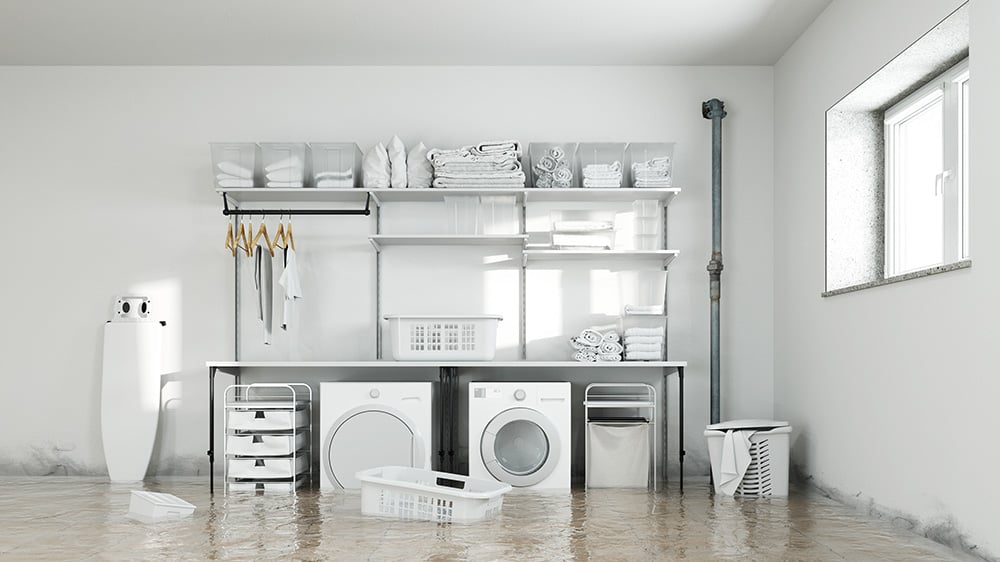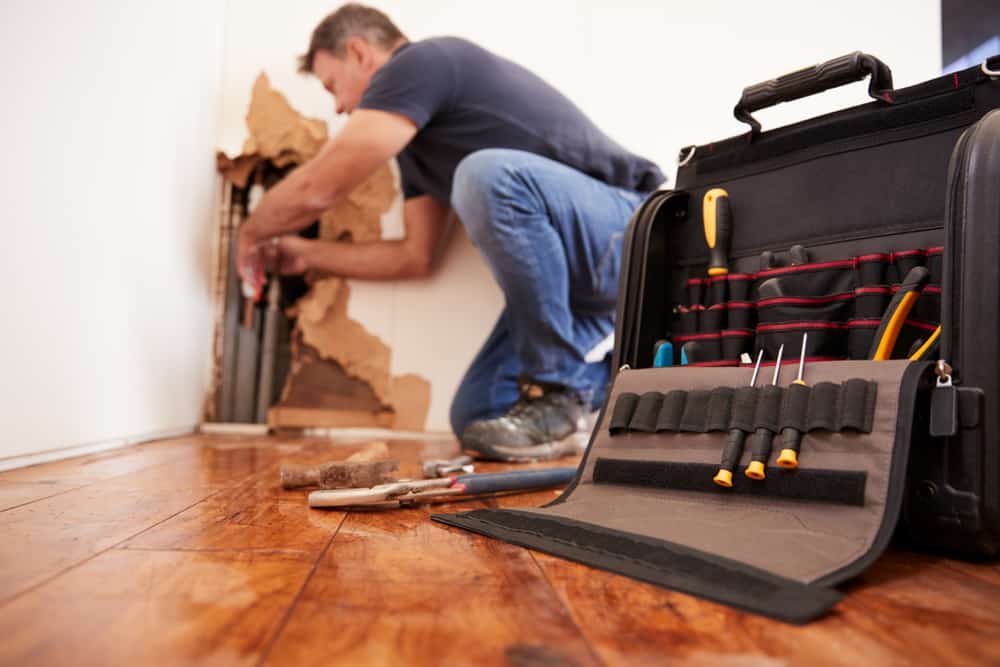Water damage can lurk undetected in your home, silently causing issues that snowball into major problems. By the time you discover it, extensive damage may necessitate urgent restoration. The key to minimizing the chaos? A quick and effective response. The faster you act to remove water and dry your property, the less damage is inflicted, saving you money and stress on the road to recovery.
Here at 1-800 WATER DAMAGE of Southwestern Indiana, we’ve seen firsthand the devastation water damage brings, and the immense peace of mind our expertise and compassion provide. Our prompt arrival and swift action minimize water’s destructive potential. Remember, according to the Federal Emergency Management Agency (FEMA), mold can take root within 24-48 hours if left unchecked.
To empower you to prevent or lessen the impact of water damage, this blog post dives into the seven most common culprits behind these events in homes. We’ll also equip you with valuable prevention tips along the way.
Leaking Pipes
Surprise! A shift in water pressure, normal wear and tear, or even a dip in temperature can all conspire to spring a leak in your pipes, potentially leading to major restoration headaches.
Prevention Tips: Regular inspections are your secret weapon to catch pipe problems early. A sudden spike in your water bill could also be a hidden leak whispering for attention. Don’t be shy about calling in a pro for those tricky, hard-to-reach areas.
Damaged Appliances
Over time, our trusty appliances can turn into ticking time bombs. Rust creeps into pipes, hoses weaken with age, and suddenly your washing machine or dishwasher turns into a geyser. Even water heaters and refrigerators can unleash their inner fountain, leaving you with a watery mess.
Prevention Tips: Be a proactive pro! Regularly inspect your appliances, replacing any parts that show signs of wear and tear. Leak detection systems are lifesavers – they automatically shut off the water supply when a leak is sprung, minimizing potential damage.
Clogged Drains
A clogged drain can morph from a minor annoyance into a major headache in a flash. Overflowing sinks or toilets aren’t just messy, they can wreak havoc on your home if not addressed quickly. This rogue water can seep into floors, walls, and cabinets, creating a breeding ground for mold and potentially causing permanent structural damage if left unchecked or improperly dried.
Prevention Tips: Routine maintenance is your defense against clogged drain disasters. Regular use of safe drain cleaners can help keep things flowing smoothly. For an extra layer of protection, consider scheduling professional drain cleaning services. These experts can provide a deep clean and identify potential problems before they become overflowing nightmares.
Faulty HVAC Systems
Your HVAC system might seem like a climate control champ, but neglect this unsung hero and it can morph into a water damage villain. Without proper cleaning and maintenance, condensation can build up and leak, leaving you with a watery mess. Here’s why: During cooling, HVAC units generate a significant amount of condensation that needs a clear path to drain away. If the drain line gets clogged or damaged, this built-up water has nowhere to go and overflows from unexpected places, potentially harming your system and your home.
Prevention Tips: Schedule regular HVAC checkups to keep your system running smoothly. Don’t forget to ensure the drain lines are clear and free of any blockages. By giving your HVAC some TLC, you’ll prevent surprise leaks and keep your home comfortable.
Roof Damage
A damaged roof is like an open door for water, especially during heavy rain or snow. If your roof’s defenses are compromised, moisture can sneak in and wreak havoc on your ceilings, walls, and insulation. Over time, this constant water exposure can lead to structural damage, unwelcome mold growth, and a cascade of costly repairs.
Prevention Tips: Regular roof and gutter inspections are your best line of defense. Look for missing or loose shingles, signs of wear, and any other damage that might be lurking.
Important Safety Note: There are several ways to inspect your roof from the ground! If you spot a potential problem that requires climbing onto the roof, or if you just want a more thorough inspection, always call a qualified roofing contractor. Safety first!
Sewage Backups
Sewage backups are a double whammy – a disgusting mess and a health hazard. That’s because wastewater can harbor harmful bacteria and pathogens, making these events a serious threat. Sewage backups are classified as “category 3” water damage due to the contaminants they carry and the potential for illness if exposed. This means the cleanup process goes beyond normal water damage restoration. Extra precautions and specific remediation measures are required to ensure the affected area is completely sanitized and safe.
Severe Weather and Natural Disasters
Severe weather and natural disasters are a force to be reckoned with. While you can’t control Mother Nature, you can be prepared for her occasional tantrums.
Prevention Tips: Living in a flood-prone area? Invest in flood sensors to give you an early warning. Regularly check your flood prevention measures – a stitch in time saves nine! Does your basement flood during heavy storms? Consider a sump pump or another drainage system to keep the water at bay. And remember, keeping belongings off the basement floor is always a smart move. Don’t forget to keep your gutters and outdoor drains clear of debris, so rainwater flows freely away from your home.
Let’s face it, even with the best intentions, water damage can happen. Plumbing malfunctions, surprise leaks from appliances, and Mother Nature’s fury are all threats we can’t completely control. The reality is, water damage can strike anywhere, anytime – especially in flood-prone areas or older homes with aging pipes. So, while we hope for the best, it’s always wise to be prepared for the worst.
Here’s how to be a water warrior: Have a plan! Knowing how to shut off your water supply in a pipe burst emergency is crucial. Keep the contact information of a trusted restoration company like 1-800 WATER DAMAGE on speed dial. And, for smooth sailing with insurance claims, maintain an up-to-date home inventory.
Remember, the golden rule of water damage? Fast action and expert restoration. By taking charge quickly, you’ll minimize the damage and get your home – and your peace of mind – back on track as soon as possible.
Once again, the seven most common causes of water damage in homes are:
- Leaking Pipes
- Damaged Appliances
- Clogged Drains
- Faulty HVAC Systems
- Roof Damage
- Sewage Backups
- Natural Disasters
Water damage is a sneaky thief – the longer it lingers, the more it steals. If you see any signs of trouble mentioned above, don’t wait! Call the water damage warriors at 1-800 WATER DAMAGE of Southwestern Indiana. We’re here to help you through this stressful time, offering technical expertise and a shoulder to lean on.
Our team will guide you through the property restoration process, taking the burden off your shoulders so you can focus on what matters most – getting your life back to normal.
If you find yourself in need of any of our services, please reach out, or give us a call at 812-610-4646, and we will get started right away.



